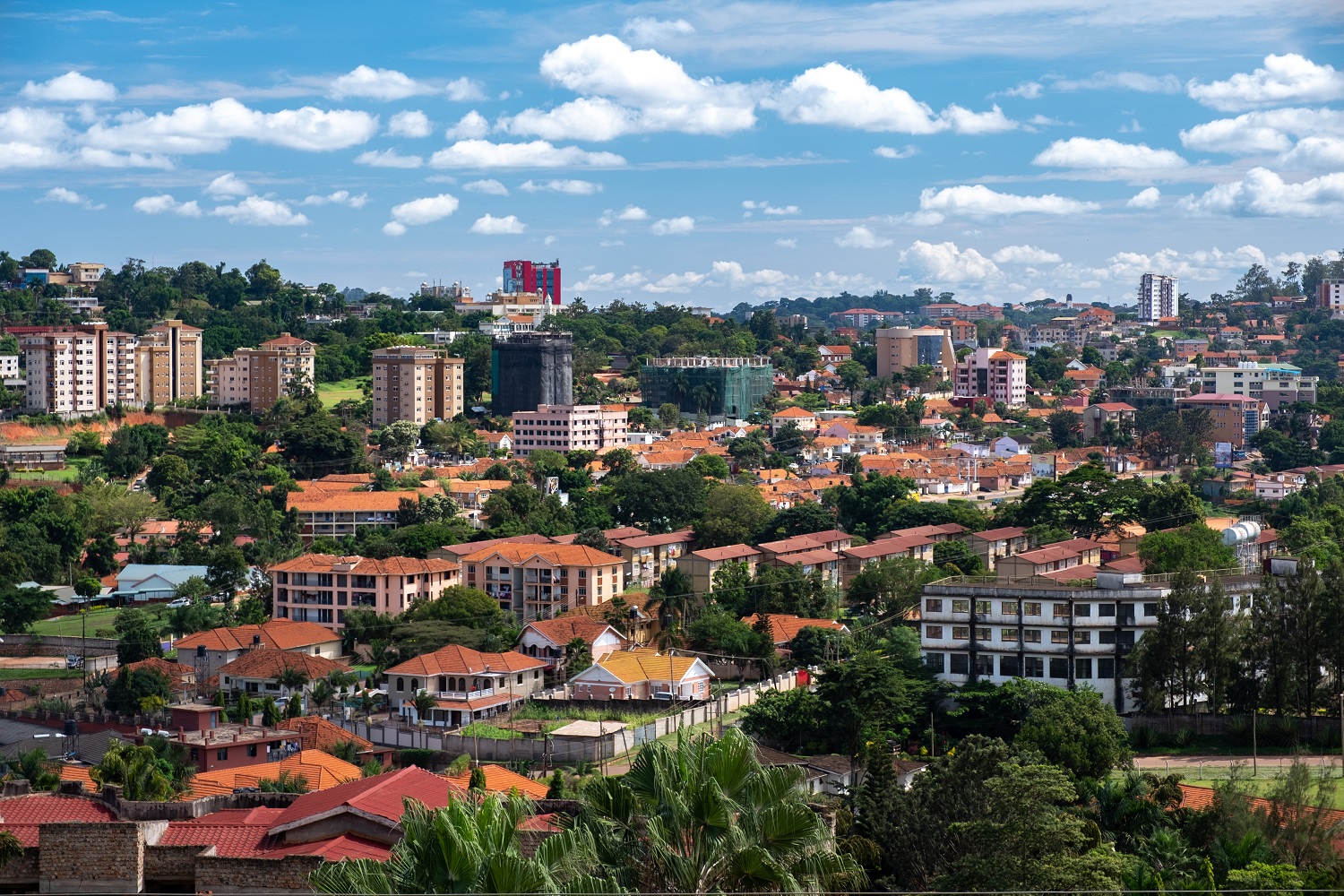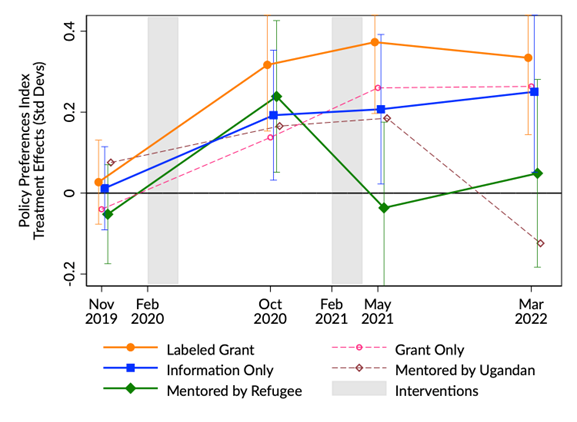Recommended
Important policies where the total benefits outweigh the costs may never be adopted because they can be blocked by the potential losers. In some cases, it’s possible to redistribute the gains to make everyone better off, or at least marshal enough support for the policy to be passed. The United States’ Trade Adjustment Assistance program is a federal policy in this vein that supports workers displaced by trade, but it’s small and not enough for a political consensus on free trade. Related proposals have been made on issues like immigration and infrastructure (e.g. minute 53 here), but trillion dollar bills remain on the sidewalk.
In a new working paper with Robert Hakiza, Helidah Ogude-Chambert, and Olivia Woldemikael, we study another example: refugee integration. Over 55 percent of refugees live in a country that significantly restricts their access to the labor market, in part because host citizens worry that refugees would take jobs or generate other costs. The economic benefits of more inclusive policies for refugees may be difficult to see directly, while the potential costs — competing over specific jobs, crowding of public services and housing, etc. — are often more intuitive and visible. When refugees cannot work or move freely, the foreign aid to support them is devoted to short-term humanitarian programs like food aid that have minimal long-run returns for refugees or hosts — even when displacement is long-term. With 74 percent of refugees living in protracted situations, 71 percent of the 24.2 billion USD spent on ODA for refugee situations in 2018–19 went to short-term humanitarian programs.
Host communities might prefer a different political bargain: allow refugees to work in exchange for sharing the foreign assistance. Ginn’s recent review of existing evidence finds that inclusive policies often have significant economic and psychosocial benefits for refugees, while the effects are small or positive for many hosts. Many citizens are therefore not “losing” from refugees’ labor market access — but some are, and others maintain that perception. As refugees integrate, foreign aid can be reallocated from short-term programs (or added) to potentially assuage these concerns. Host governments have started signing on to this framework, known as the compact model and discussed below. But will citizens be persuaded to support inclusion by assistance, especially when attitudes toward immigrants are often driven by non-economic factors?
The experiment
We designed a randomized controlled trial with Ugandan small business owners in Kampala, Uganda to test whether foreign aid programs for citizens that are directly linked to hosting refugees can change views toward refugee policy. Uganda hosts the sixth largest refugee population globally and allows refugees to work and live outside of settlements. The government also stipulates that at least 30 percent of aid to refugees be shared with Ugandans, but awareness of this policy is low. Ugandans might unknowingly be using a school or health facility, or even receive a direct program, that was partially funded by the refugee response. Our interventions were designed to explicitly highlight the benefits of hosting refugees, focusing on this policy and the assistance Ugandans receive, and connect them with inclusive policies.
Our goal was to combine an information campaign, using evidence-based techniques from other contexts, with an effective economic aid program. We chose business grants, given their relatively strong evidence base, to deliver alongside the short script. For a separate group, we designed a business mentorship program, based on promising evidence from Nairobi, that matched respondents with a refugee business owner who had more experience. Mentorship pairs met twice in person on average before the program was suspended due to COVID-19, and we compare this business-related contact with the grant and information. Finally, to further connect our programs to the refugee presence, we delivered the interventions through a refugee-led organization, Young African Refugees for Integral Development (YARID), which serves Ugandans as well as refugees.
We find that grants delivered with information on aid-sharing and YARID (“labeled grants”) substantially increase support for inclusive policies toward refugees. When delivered separately, the information and grants alone also affect views, but the effects are smaller. Figure 1 shows that the effects persist for at least two years, which is the longest follow-up we are aware of among experiments targeting attitudes toward immigrants. We find minimal effects from interpersonal contact with refugees through the mentorship program.
Figure 1. Effects on policy preferences over time
Notes: Each line shows the estimated treatment impact on a summary index of preferences for policies supporting inclusive refugee hosting over time. See Baseler et al. (2023) for details.
The labeled grants shift respondents’ views on the economic benefits of hosting refugees. Respondents in this group are more likely to associate assistance with refugees, know that foreign aid is shared with Ugandans, and believe the economic effect of refugees on them personally and Uganda is positive. This also leads to more positive social attitudes like their level of comfort with refugees as neighbors. We do not find effects on economic outcomes like business openness or profits from the grants or mentorship, possibly due to COVID-19-related shocks in the middle of the study. The working paper of course contains much more.
We see four main takeaways for policymakers, practitioners, and donors in refugee situations:
- Include host communities in assistance. Support that is only directed to refugees can further tensions between refugees and hosts, while shared assistance can facilitate positive relations.
- Use an informational script to make the connection between the assistance and the presence of refugees clear. Aid programs increasingly include hosts, but hosts may be unaware that the program exists because of the refugee presence, especially in urban areas or when it’s allocated to services like health or education.
- Incorporate social cohesion into ongoing programming for livelihoods, health, education, and other main sectors. Using ongoing programs to further social cohesion, rather than standalone programs, is likely more cost effective and may be more effective overall in shifting attitudes.
- Deliver assistance through refugee-led organizations, who can be ideal implementing partners to highlight the link between assistance and refugees. While the 2016 Grand Bargain pledged to allocate 25 percent of humanitarian funding to local organizations by 2020, disbursements amounted to 1.2 percent in 2021. Refugee-led organizations can play a unique and important role in social cohesion that donors should support.
The big picture
Our experiment is motivated by the compact model, where host governments agree to more inclusive policies in exchange for additional foreign assistance. The Jordan Compact, for instance, has expanded work opportunities for Syrian refugees in Jordan in exchange for concessional financing and preferential trade agreements for Jordanians. In 2018, these principles were endorsed by the UN General Assembly in the Global Compact on Refugees. And while not a compact per se, the World Bank’s Window for Host Communities and Refugees operationalizes these ideas, with financing that is medium-term and includes host communities in exchange for more inclusive refugee policies.
Our study suggests these initiatives can build social cohesion between refugees and hosts — a hot topic among refugee policymakers (and think tanks, too). Positive attitudes toward refugees could make it easier for governments to adopt more inclusive policies and can facilitate better economic outcomes for refugees directly. We argue that programs that include hosts are often missing a cost-effective opportunity to further social cohesion: adding a message that connects the assistance to the refugee presence. Since contexts differ, we’re interested in testing these ideas elsewhere. If your organization is interested in exploring, let us know!
Disclaimer
CGD blog posts reflect the views of the authors, drawing on prior research and experience in their areas of expertise. CGD is a nonpartisan, independent organization and does not take institutional positions.
Image credit for social media/web: Adobe Stock







